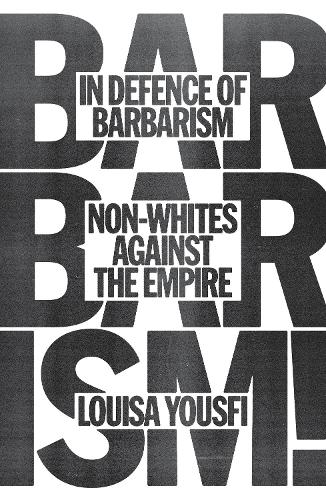
In Defence of Barbarism: Non-Whites Against the Empire
(Paperback)
Publishing Details
In Defence of Barbarism: Non-Whites Against the Empire
By (Author) Louisa Yousfi
Translated by Andy Bliss
Verso Books
Verso Books
3rd June 2025
United Kingdom
Classifications
General
Non Fiction
Ethnic groups and multicultural studies
305.896073044
Physical Properties
Paperback
112
Width 129mm, Height 198mm, Spine 8mm
98g
Description
Is social integration all its cracked up to be Not in the defiant view of first-time French author Louisa Yousfi, who herself has North African roots. Taking its inspiration from the leading Algerian writer Kateb Yacine (Im better off not being too cultivated. I have to retain a certain barbarianism), this provocative essay explores ways of resisting the cultural and moral hegemony of the French Empire. Citing a wide range of cultural references, from the characters of Chester Himes and Toni Morrison to the in-your-face rap lyrics of the street prophets Booba and PNL, she extolls the virtues of her inner barbarian and champions those brave souls who refuse to be domesticated. Challenging the conventional wisdom that posits integration as an unalloyed good, she shows how assimilation can equate to the loss of traditions, religion, language, and culture. And, whether discussing 9/11, the Algerian colonial era, the media treatment of celebrities of Arab origin, or the second-class status of French citizens from an immigrant background, she holds an uncompromising mirror up to the West and its moral shortcomings, as if to say: a barbarian I may be, but who is the real monster Yousfi - a young, charismatic and dynamic author who uses a refreshingly wide range of cultural reference points, including rap music, to construct her argument - opens up the path of a decolonial cultural politics and an aesthetics of resistance.
Reviews
In her brilliant and hard-hitting essay Rester barbare, the journalist references the writer Kateb Yacine as well as the rappers Booba and PNL to lay the foundations of a literary manifesto for a new decolonial mode of thinking in France. -- Bruno Deruisseau * Les Inrockuptibles *
No question about it: with Rester barbare, Louisa Yousfi has produced an important text. A literary essay, a political manifesto informed by decolonial thinking, a powerful description of a collapsing world, and a reflection on integration and assimilation, Rester barbare gives a platform to indomitable voices that the West would prefer to silence. -- Johan Faerber * Diacritik *
In a hard-hitting essay, journalist Louisa Yousfi reveals how an overabundance of culture has dampened her desire to "remain a barbarian". Drawing on Booba's rap, the writings of American authors (Chester Himes, Toni Morrison) and her own experience as an Arab and Muslim woman, she tenderly describes a figure of the barbarian who would benefit from being cherished rather than hated, protected rather than hidden. -- Marie-ve Lacasse * Libration *
A feeling of illegitimacy is shared by almost all class defectors. Whereas so many people who come from the dominant classes never ask themselves whether they are legitimate or not. They 'naturally' are. I've just read In Defence of Barbarism by Louisa Yousfi, a fairly short text. She is a journalist, the daughter of Algerian immigrants. She takes as her starting point a phrase by Kateb Yacine, who says: "I must retain a kind of barbarism, I must remain barbaric." Basically, she's opposed to total integration, using the rapper Booba as an example, his way of resisting assimilation. Staying barbaric echoes in me what I experience in the literary and media fields. It seems to me that the dominant classes are in no hurry to assimilate those who speak for the world they come from, to neutralise them in short. People would like me to forget everything that made my books exist, the social violence on which La Place and La Honte, for example, were written. -- Annie Ernaux, winner of the 2022 Nobel Prize in Literature
Louisa Yousfi, "a model pupil of the Republic" as she describes herself, has written a magnificent, stimulating and elegantly written essay "in defense of barbarism." She explains why refusing domestication, pious and hypocritical niceties, the offer to be brought in the fold of assimilation, is the only way to produce pure creative acts and poetry. Compelling. A gem. -- Franoise Vergs, author of A Decolonial Feminism
Author Bio
The journalist Louisa Yousfi grew up in south-eastern France in the 1990s. She took a literature course at a crammer in Lille and then studied philosophy in Nice, ultimately enrolling in journalism school in Bordeaux. She was a conscientious student, following the advice of her working-class parents, who had emigrated from Algeria to France, to focus on [her] studies first and worry about politics later. This political engagement duly materialised when she joined the Parti des Indignes de la Rpublique, an anti-racist and decolonial movement whose ideas had a decisive influence on her first published work, Rester barbare. She is currently working on her first novel.
